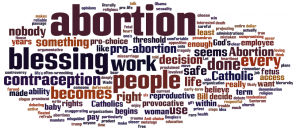 Whenever I write or talk about abortion and reproductive rights, I’m careful to describe each side with the term it has chosen for itself: “pro-life” and “pro-choice”. It’s a simple policy decision, really — any discussion of the appropriateness of either term quickly becomes tendentious, and people have a right to decide how to self-identify.
Whenever I write or talk about abortion and reproductive rights, I’m careful to describe each side with the term it has chosen for itself: “pro-life” and “pro-choice”. It’s a simple policy decision, really — any discussion of the appropriateness of either term quickly becomes tendentious, and people have a right to decide how to self-identify.
Which doesn’t mean I don’t have opinions about the terms people use. “Anti-choice” and “anti-life” are argumentative metatags. “Anti-abortion” seems descriptive and largely not provocative, although I understand the preference for being “pro” something.
Conversely, “pro-abortion” does seem provocative and inappropriate. For years I told myself, nobody is really pro-abortion, but people like me believe a woman should have the right, at least under some circumstances, to decide whether to have an abortion.
I’ve been pro-choice my entire adult life, but I’ve never been entirely comfortable with it. Bill Clinton had it about right when he said abortion should be “safe, legal and rare.” Abortion is a deeply personal, sometimes wrenching decision made on the threshold of life and death. It’s much like the decision, at the other end of the timeline, on whether to remove the feeding tube or refrain from resuscitation. At both ends, I believe the choice should be made by the people who are most directly affected, and the rest of us should move along.
But there is, at the very least, something morally ambiguous about abortion, and it becomes more troubling the closer the fetus comes to viability. I’m not particularly interested in debating when life begins — it’s enough to know that it does begin. Barring miscarriage, disease or trauma, the fetus eventually becomes a baby. If someone says “abortion is murder” I have no trouble ignoring them. The slogan that clutches at my soul is “abortion stops a beating heart.”*
In recent years, it’s become clear I was mistaken in believing nobody is “pro-abortion.” I was projecting my own values onto people who did not necessarily share them. I was utterly appalled when a prominent priest in my own Episcopal denomination proclaimed that “abortion is a blessing” — under every circumstance.
Think I may be exaggerating? Here’s the passage in question:
And when a woman becomes pregnant within a loving, supportive, respectful relationship; has every option open to her; decides she does not wish to bear a child; and has access to a safe, affordable abortion — there is not a tragedy in sight — only blessing. The ability to enjoy God’s good gift of sexuality without compromising one’s education, life’s work, or ability to put to use God’s gifts and call is simply blessing.
These are the two things I want you, please, to remember — abortion is a blessing and our work is not done. Let me hear you say it: abortion is a blessing and our work is not done. Abortion is a blessing and our work is not done. Abortion is a blessing and our work is not done.
Now that same mindset — the idea that reproductive rights are absolute and trump every other consideration — is at play in the current controversy over the Obama administrations mandate that Catholic organizations must cover contraception free of charge in their employee health plans.
Personally I think the Catholic Church’s opposition to all contraception — whether or not abortifacients are involved — is silly and misguided. Most Catholics outside the hierarchy agree. The 98% figure floated by the White House seems to be exaggerated, but it’s safe to say the overwhelming majority of sexual active Catholics use contraception if they don’t want to make a baby.
But nobody is talking about denying anyone access to contraception. Any person with a job that includes healthcare coverage makes enough money to be able to afford some form of reliable birth control, even if the employee has to pay every dollar of the cost. The debate is whether a Catholic organization should be forced to pay for a product or service that the church believes is immoral.
Despite Justice Douglas’s emanations from penumbras, the Bill of Rights doesn’t actually say anything about reproductive rights. But it does say something, explicitly and forcefully, about religion. Liberals and Democrats would be well-advised to be more deferential to religious liberty when one of the three people most likely to win the next presidential election is Rick Santorum.
* This isn’t literally true of very early-term abortions. But fetal heartbeat begins as early as week six — well within the first-trimester threshold established by Roe v. Wade.
